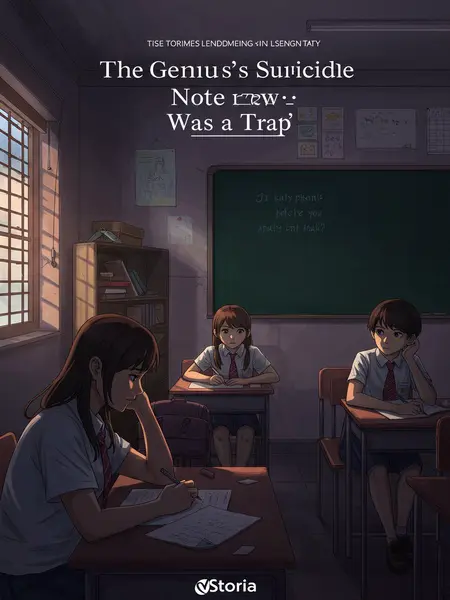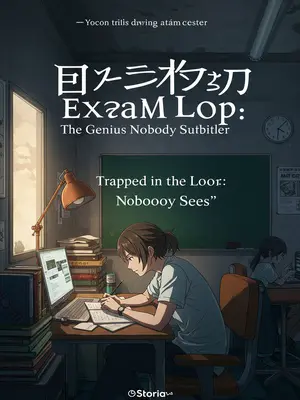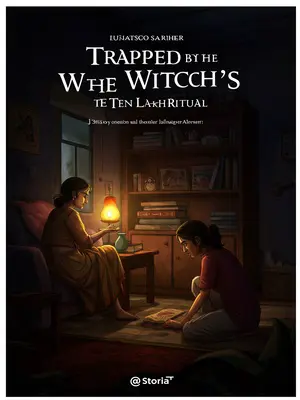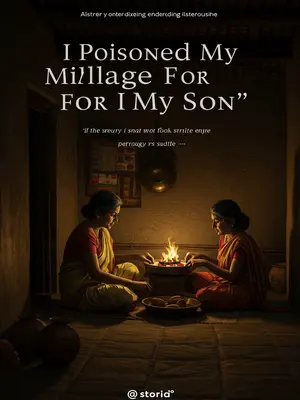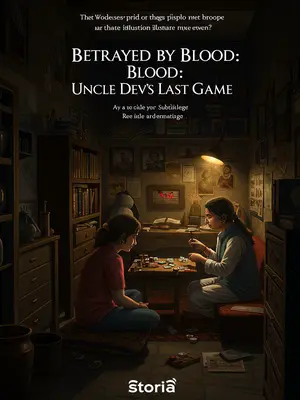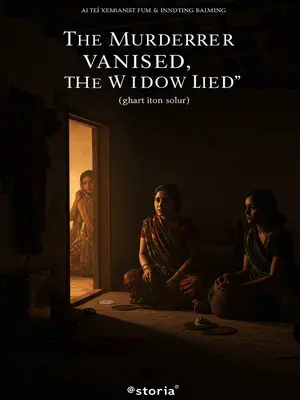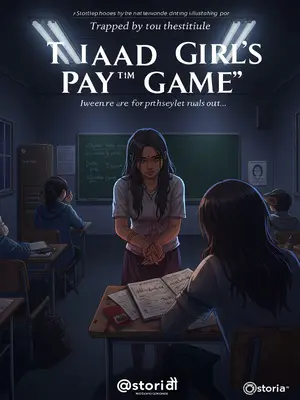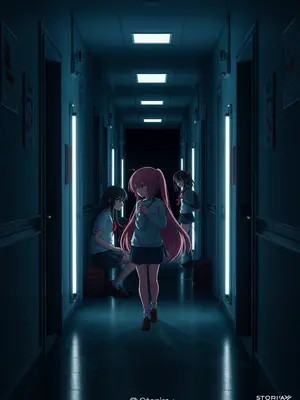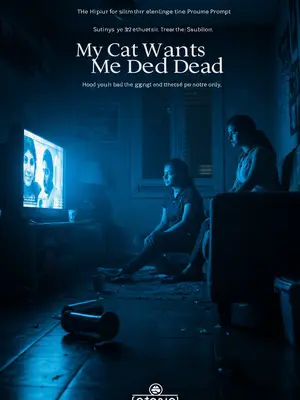Chapter 3: A Father’s Desperation
A month later, my son Kabir’s board exam results were released.
The same anticipation, the same waiting outside the school gates, the same anxiety. But this time, the results came with a strange sense of relief and unease.
He performed exceptionally well, miraculously scoring above the cutoff for regular high school, bringing honour to our family.
My wife made kheer, neighbours came to congratulate us, and Kabir grinned from ear to ear, his cheeks still smeared with a trace of Holi colour from the month before. I hugged him, pride and surprise mingling in my heart.
I asked him what reward he wanted. He asked me to take him to the mall to play in the inflatable castle—to relive the joy of childhood.
I ruffled his hair, laughing. “Arrey, Kabir, that’s for little kids! Still want to go?” But he insisted, and I agreed—one last time, for old times’ sake.
I was reluctant, but I took him anyway.
On the way, I told him to mind his shoes, to behave properly, to not embarrass me in public. Kabir rolled his eyes, promising he’d be careful. We reached the mall, the AC a welcome relief from the punishing heat outside.
But while I stepped out to buy cigarettes, my son disappeared.
The mall’s AC was cold, but sweat trickled down my back. My mouth tasted of fear. Just a moment—barely five minutes. When I came back, the castle was empty, and my boy was nowhere to be seen. My heart began to thud in my chest, sweat breaking out on my forehead despite the cool air.
I searched every corner of the mall, but there was no trace of him.
I ran past the food court, past the toy shops, calling his name. Security guards tried to help, but their faces were blank, uncomprehending. “Maybe he’s in the washroom, Sir?” they suggested. But he wasn’t.
He had his mobile with him that day. I called repeatedly, but his phone was always switched off.
With every unanswered ring, dread pooled in my stomach. I tried again and again, my hand trembling as I pressed redial. As I waited, a WhatsApp notification pinged—a joke from my family group. I almost threw the phone across the floor in frustration.
I called my wife, Meera, to ask if our son had come home.
She picked up after the first ring, her voice anxious. “Why are you calling, what happened?”
Meera was puzzled: “No. Didn’t you take him to the mall?”
Her voice rose, panic blossoming. I tried to sound calm, but she could hear the fear beneath my words. “Check again, maybe he slipped away?” I said, knowing it was hopeless.
A terrible premonition rose in my chest.
The sort of icy dread that seeps into your bones and refuses to leave. I wiped the sweat from my brow, feeling the beginnings of a headache pulsing at my temples.
In our line of work, our greatest fear is that our enemies will target our families.
The thought alone made me dizzy. I had seen too many such cases—revenge, kidnapping, old grudges coming home to roost.
After nearly thirty years as a police officer, I’ve put away enough criminals to fill a railway bogie.
I could see their faces in my mind’s eye—lined up in a police van, hands cuffed, eyes burning with hatred. Any one of them could want revenge. Any one of them could be behind this.
Murderers, kidnappers, sexual predators, organ traffickers…
Names and faces flashed before me—some cursing, some begging, some simply silent. They all had reasons to hate me.
Their vicious faces flashed through my mind like a slideshow.
It was like watching an old film reel: the desperate eyes, the twisted sneers, the silent threats. My breath came out in sharp, uneven bursts.
A chill ran down my spine.
I shivered, despite the stifling heat. My hands wouldn’t stop shaking.
I immediately called my apprentice, Amit, and told him to bring the team.
He didn’t ask questions, just replied, “Yes, Sir,” his voice tense. Within minutes, the station jeep was on its way.
The officers split up to search while Amit and I checked the surveillance footage.
We hunched over the grainy monitor in the security room, the AC buzzing overhead, sweat beading on our brows. Time felt like sand slipping through our fingers.
The blurry video showed a shadow sneaking behind the inflatable castle when no one was looking.
We paused, rewound, played the clip again. There—a dark figure, moving with purpose, blending into the crowd.
Behind the inflatable castle was the mall’s back door. Not far from there, in a small alley, we found Kabir’s broken keychain, his mobile smashed to pieces, and a piece of scaffolding pipe nearby, with signs of a struggle.
I dropped to my knees in the dust, my heart hammering as I picked up the broken pieces. The keychain was one I had gifted him last Diwali—a cheap plastic thing, now split in two.
The steel pipe was sent for fingerprint analysis.
I snapped orders at the forensic team, barely keeping my voice steady. Every second counted.
There were many prints. We ran them through the database and quickly got a match—Rajesh Singh.
As soon as his name popped up on the computer, my blood ran cold.
I remembered Rajesh Singh well.
Four years ago, he was arrested for rape, and I was the lead interrogator.
He’d spat at my feet, screamed abuse, threatened to curse my family. I’d seen the hatred in his eyes. Now, his name was back, haunting me all over again.
After his release, he ran a scaffolding rental shop in the neighbouring district.
He’d kept a low profile—no trouble, no complaints. But people like him never forget a grudge.
His son, Rohan, was Kabir’s classmate—the same one who jumped during the board exam a month ago.
The connection hit me like a slap from fate. Suddenly, all the pieces began to fall into place. My head spun with the implications.
No doubt, he was our prime suspect.
Amit looked at me, waiting for instructions. My jaw clenched, I barked, “Find him.”
We immediately brought Rajesh Singh in for questioning.
He didn’t protest, didn’t argue. Just smiled, as if he’d been expecting us. I felt the urge to wipe that smug look off his face.
He seemed prepared and cooperated as we brought him to the station.
Not a single sign of fear. He sat down across the table, arms folded, eyes steady. A corner of his mouth twitched in something like amusement.
According to protocol, as a party to the case, I should have recused myself.
But in that moment, procedure meant nothing to me. My son was missing—rules could wait.
But I couldn’t care less at that point.
I told Amit to stay close, to watch my back, but my mind was already racing ahead to the questions I needed answered.
I used every trick I knew, every interrogation technique, but Rajesh Singh kept his mouth shut. No matter how I pressed, he wouldn’t say a word.
He looked through me as if I was a child pestering him for sweets. Sweat dripped down my back as the minutes ticked by.
There was only half an hour left before the 12-hour detention limit.
I watched the clock with mounting dread. Every second that passed, I imagined Kabir slipping further away.
According to the Criminal Procedure Code, detention cannot exceed 12 hours without formal charges.
I thought of all the times I’d explained this to junior officers. Now, the law felt like a noose tightening around my neck.
Half an hour later, we would have to let him go.
I clenched my teeth, rage and helplessness swirling inside me. How could the law be so cruel?
I suddenly stood up, turned off the surveillance equipment, and said to Amit, who was interrogating with me, “Go outside.”
Amit’s eyes widened. He knew what I was about to do. “Sir, please—don’t…”
He refused, worried I’d do something rash.
I could see the fear on his face, the loyalty fighting with duty.
I lost my temper and shouted, “Get out! Now!”
My voice cracked, echoing off the walls. Amit hesitated, then slowly backed out, casting a last worried glance my way.
He stubbornly refused to budge.
I felt the weight of his gaze, pleading for me not to cross the line. But my mind was made up.
At that moment, Rajesh Singh finally spoke, his voice low and calm: “Inspector, you go. I want to speak to Officer Sharma alone.”
There was a pause, a heavy silence. Amit looked to me for instructions. I nodded once. He left, closing the door softly behind him.
Only Rajesh Singh and I remained in the interrogation room.
The old ceiling fan spun lazily overhead, making more noise than wind. My hand hovered over the desk, fingers twitching. My eyes landed for a moment on the small Ganesha idol at the corner of my desk—I hesitated, breathing deeply, before anger took over again.
“Officer Sharma, long time no see.”
His voice had an odd politeness, like a snake’s hiss pretending to be a lullaby.
“Rajesh Singh, what do you want? Where’s my son?”
He cocked his head, studied my face. “Officer Sharma, you care about your son. But what about my son? Have you figured out the real cause of Rohan’s death?”
I clenched my jaw, refusing to answer.
“Rajesh Singh, haven’t I told you? Rohan committed suicide due to depression. The hospital confirmed moderate depression and provided his prescription records. Do you think those are fake?”
He sneered, as if I had missed the obvious.
“Even if it was depression, why did he have to die during the board exam?”
His words sliced through the air, leaving a bitter taste in my mouth.
I was at a loss for words.
I looked down at my hands, knuckles white with tension.
Seeing my silence, Rajesh Singh stared at me and said, word by word, “Do you really think your son was capable of passing the high school cutoff?”
His tone was mocking, but his eyes were stone-cold. I felt a shiver run through me.
My heart clenched, as if gripped by an invisible hand. “What do you mean?” I managed to ask.
My voice was a whisper, barely more than a breath.
His expression turned sinister, his voice cold: “You have a son, so maybe you can understand what it’s like to watch your own child die before your eyes. Haven’t you ever wondered why a boy with no exam pressure would kill himself at the last moment of the board exam? Shouldn’t someone pay the price for his death?”
He leaned forward, his breath hot and sour. For a moment, I felt like I was the one being interrogated.
